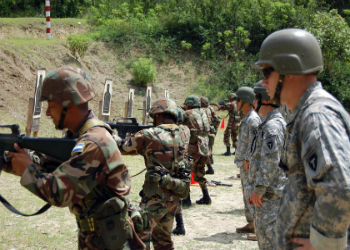A new database compiled by a Washington, DC-based advocacy group aims to increase transparency surrounding US security assistance programs across Latin America, with the hope that this will lead to improved monitoring and evaluation of those initiatives.
The Washington Office on Latin America (WOLA) has created the “Defense Oversight Research Database,” a platform that lists the programs the United States is currently implementing to assist military and police forces abroad in an effort to help assess their impact in Latin America.
The database shows what each program consists of, the amount of money it can receive, and when it was established. It also includes relevant news articles and other reports.
Of the 107 US security assistance programs operating globally, WOLA found that 75 operate in Latin America, and that the United States works with security forces across the region, except in Cuba, Bolivia and Venezuela.
Since 2000, the United States has invested an estimated $20.5 billion in security assistance programs in Latin America, over $17 billion of which has been spent on programs to counter drugs and organized crime, according to WOLA.
The two largest recipients have been Colombia ($9.5 billion) and Mexico ($2.5 billion), both of which obtained large anti-drug packages throughout the 2000s. This changed by 2016, when the three countries of the Northern Triangle — El Salvador, Guatemala and Honduras — collectively received more aid than either Colombia or Mexico, as the United States shifted more focus to the sub-region’s high crime rates.
The Trump administration has vowed to increase defense spending, while slashing US foreign aid for economic development. It remains to be seen whether this will lead to new funds for US security programs across Latin America, or to a general decrease in US assistance to the region.
InSight Crime Analysis
WOLA’s initiative seeks to increase the transparency and effectiveness of US security assistance to Latin America and the rest of the world.
“If you want to understand the whole of the US assistance packages, that information is really difficult to find, and has never been in one place,” Sarah Kinosian, who helped compile WOLA’s database, told InSight Crime. “If you can’t even put together an overall picture of what the US assistance looks like, how are exactly are you meant to evaluate it?”
SEE ALSO: Coverage of Security Policy
By providing a comprehensive database of all US defense assistance programs, WOLA aims to subject them to continued citizen oversight.
US-backed security programs in Latin America have had a mixed record, both in terms of their long-term efficacy as well as their impact on human rights. For example, the Central America Regional Security Initiative (CARSI) — a project through which the United States has pumped over $1 billion since 2008 — has been subject to debate about whether or not its gang and violence prevention programs have shown positive results. Other major security initiatives, like the multibillion-dollar Plan Colombia package, have also been critiqued for falling short of some of their objectives.
Monitoring compliance with human rights conditions has been another major issue with US security aid. While the United States passed a law designed to weed out foreign security forces implicated in human rights abuses — the so-called Leahy Law — the State Department office that manages the vetting process is poorly funded, and the law itself is riddled with loopholes that have reportedly been used to circumvent it.
The general lack of monitoring and evaluation of US security assistance programs makes it difficult to assess the extent to which packages like CARSI and the Merida Initiative helped to address security concerns in the countries where they were implemented.
Given this context, WOLA’s database is a promising first step toward improving the transparency surrounding these programs. But the increased oversight of US security aid programs might not be enough on its own, warns Kinosian. Together with more effective and transparent military assistance, she says, US policymakers should also promote more long-terms programs that address the root causes of violence in the region, such as “rural development, alternative crops, or the strengthening of public instituions — programs that address the core of these threats as opposed to the mere symptoms.”

